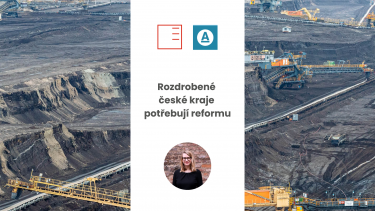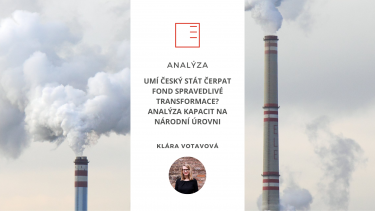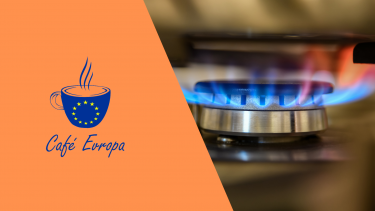Aktuálně.cz | Fragmented Czech Regions Need Reform
In the autumn, regional council elections will be held. The existence of 14 regions in the Czech Republic, however, does not have a long tradition – they were only established in 2000, partly due to the anticipated entry into the European Union. This arrangement is now heavily criticized for their fragmentation, low and duplicative administrative capacities, and the associated negative impacts on the state budget. Klára Votavová, a researcher at EUROPEUM Institute, presents in her commentary on research on the capacities of the state and regions to draw from the Just Transition Fund, using the examples of the Karlovy Vary and Moravian-Silesian regions.
Show moreAnalysis | Can the Czech state distribute the just transition fund? Analysis of its capacities at the national level
The aim of this research report is to determine, through interviews with officials and other relevant stakeholders, whether the Czech public administration has sufficient capacity and organisational capability to effectively draw down funds from the Just Transition Fund. The author of the publication is Klára Votavová, researcher at EUROPEUM Institute.
Show moreEuractiv | Special EU fund for coal regions looks good but is costly
Establishing a new European fund to support coal regions may be perceived as a positive political step towards affected areas. However, the management of this fund poses challenges, not only in terms of finances but also in terms of personnel and time constraints, which could jeopardize its effective utilization. This conclusion arises from consultations with representatives of public administration and relevant regions and from their analysis conducted by Klára Votavová, member of research team at EUROPEUM.
Show moreBLOG | Is the lack of state administration capacity preventing the effective use of the Fair Transformation Fund? A first insight into research on absorption
The Czech state administration is facing mistrust because of problems with civil servants and delays in social benefits. Researcher Klára Votavová examines how the administration deals with the distribution of the Fair Transition Fund, which is intended to help coal regions transition to a new economy. The CZK 42 billion goes to the Moravian-Silesian, Karlovy Vary and Ústí Regions.
Show moreEuractiv | Moravian-Silesian Region wants to spend "coal billions" on big projects, but they are still risky
The Moravian-Silesian Region is one of the three Czech coal regions that will receive extra money from the European Union. Klára Votavová, a researcher at EUROPEUM Institute, answered questions about the funds intended for the "special needs" of the burdened regions.
Show moreSUMMARY OF EXPERIENCES WITH THE INVOLVEMENT OF CSOS IN V4 IN THE DECARBONISATION PROCESS
The project is focused on the examination of the role of non-governmental organizations in the process of decarbonization of coal regions in V4 countries (Czech Republic, Hungary, Poland, Slovakia). The aim of the project is to describe the best and worst practices of the individual processes for Serbia, who awaits the transformation of its energy mix, largely based on coal. The examined V4 countries have had a slightly different share of coal in their energy mix, while the largest one being in Poland and the second largest one in the Czech Republic, followed by Hungary and Slovakia. There are many similarities and differences in their takes on decarbonisation, thus providing different range of experiences.
Show more PDF

Empowering Serbian CSOs involved in the decarbonization process through the V4 experience
Read the background paper for the Belgrade conference, which focuses on the phasing out of coal mining in the V4 countries, to representatives of Serbian civil society. Our project manager and junior researcher Tatiana Mindekova worked on the paper on behalf of EUROPEUM Institute for European Policy.
Show more PDFINVITATION: Café Evropa online: The future of European energy - how to ensure stable and clean energy sources without Russia?
We would like to invite you to the Café Evropa debate on 21 March at 17:30 on the topic "The future of European energy - how to ensure stable and clean energy sources without Russia?". The Russian invasion of Ukraine has, among other things, further fuelled the question of energy security in the Czech Republic and the EU and the future of energy in our country. The current security situation points to the need to diversify energy sources as soon as possible, i.e. to secure energy supplies from different regions and countries in order to avoid excessive dependence on Russia. There are also views in the public debate that coal extraction could be temporarily increased, which would enable some countries to cover any shortfalls in resources. Is a complete or even partial halt of Russian gas supplies to the Czech Republic and the European Union a realistic option? What impact would this have on our energy security? How much further increase in energy prices can we expect in this case? How should EU countries react and help households and industry cope with the expected increase? Could a possible temporary increase in coal extraction mean a return to fossil fuels and the end of the EU's climate ambitions? Or could the current problematic situation further accelerate the energy transition?
Show moreINVITATION: Café Evropa online: The end of coal in the Czech Republic - What is the future of coal regions in Czechia?
EUROPEUM Institute for European Policy cordially invites you to another debate from the Café Evropa series, which will take place on Monday 21 September from 5.30 PM online on Facebook. Our guests will discuss the topic of the future of coal regions in the Czech Republic.
Show more PDF

REPORT: Prague Climate Talks: Just Transition Fund: a chance for Czech coal regions?
On 16th June 2020 we organized this year's second online debate from the Climate Talks cycle. The topic was the Just Transition Fund.
Show more PDF
Staroměstské náměstí 4/1
Prague 1 - Staré Město
110 00
tel.: +420 212 246 552
email: europeum@europeum.org
https://www.europeum.org









